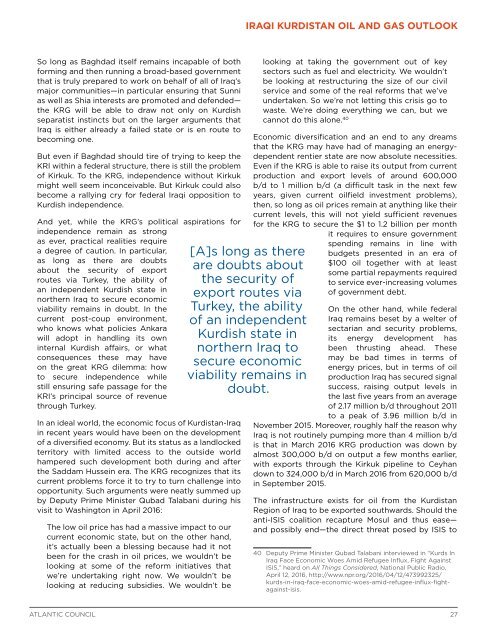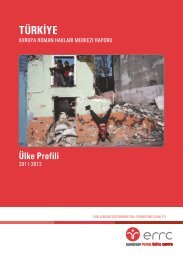You also want an ePaper? Increase the reach of your titles
YUMPU automatically turns print PDFs into web optimized ePapers that Google loves.
<strong>IRAQI</strong> <strong>KURDISTAN</strong> <strong>OIL</strong> <strong>AND</strong> <strong>GAS</strong> <strong>OUTLOOK</strong><br />
So long as Baghdad itself remains incapable of both<br />
forming and then running a broad-based government<br />
that is truly prepared to work on behalf of all of Iraq’s<br />
major communities—in particular ensuring that Sunni<br />
as well as Shia interests are promoted and defended—<br />
the KRG will be able to draw not only on Kurdish<br />
separatist instincts but on the larger arguments that<br />
Iraq is either already a failed state or is en route to<br />
becoming one.<br />
But even if Baghdad should tire of trying to keep the<br />
KRI within a federal structure, there is still the problem<br />
of Kirkuk. To the KRG, independence without Kirkuk<br />
might well seem inconceivable. But Kirkuk could also<br />
become a rallying cry for federal Iraqi opposition to<br />
Kurdish independence.<br />
And yet, while the KRG’s political aspirations for<br />
independence remain as strong<br />
as ever, practical realities require<br />
a degree of caution. In particular,<br />
as long as there are doubts<br />
about the security of export<br />
routes via Turkey, the ability of<br />
an independent Kurdish state in<br />
northern Iraq to secure economic<br />
viability remains in doubt. In the<br />
current post-coup environment,<br />
who knows what policies Ankara<br />
will adopt in handling its own<br />
internal Kurdish affairs, or what<br />
consequences these may have<br />
on the great KRG dilemma: how<br />
to secure independence while<br />
still ensuring safe passage for the<br />
KRI’s principal source of revenue<br />
through Turkey.<br />
In an ideal world, the economic focus of Kurdistan-lraq<br />
in recent years would have been on the development<br />
of a diversified economy. But its status as a landlocked<br />
territory with limited access to the outside world<br />
hampered such development both during and after<br />
the Saddam Hussein era. The KRG recognizes that its<br />
current problems force it to try to turn challenge into<br />
opportunity. Such arguments were neatly summed up<br />
by Deputy Prime Minister Qubad Talabani during his<br />
visit to Washington in April 2016:<br />
The low oil price has had a massive impact to our<br />
current economic state, but on the other hand,<br />
it’s actually been a blessing because had it not<br />
been for the crash in oil prices, we wouldn’t be<br />
looking at some of the reform initiatives that<br />
we’re undertaking right now. We wouldn’t be<br />
looking at reducing subsidies. We wouldn’t be<br />
[A]s long as there<br />
are doubts about<br />
the security of<br />
export routes via<br />
Turkey, the ability<br />
of an independent<br />
Kurdish state in<br />
northern Iraq to<br />
secure economic<br />
viability remains in<br />
doubt.<br />
looking at taking the government out of key<br />
sectors such as fuel and electricity. We wouldn’t<br />
be looking at restructuring the size of our civil<br />
service and some of the real reforms that we’ve<br />
undertaken. So we’re not letting this crisis go to<br />
waste. We’re doing everything we can, but we<br />
cannot do this alone. 40<br />
Economic diversification and an end to any dreams<br />
that the KRG may have had of managing an energydependent<br />
rentier state are now absolute necessities.<br />
Even if the KRG is able to raise its output from current<br />
production and export levels of around 600,000<br />
b/d to 1 million b/d (a difficult task in the next few<br />
years, given current oilfield investment problems),<br />
then, so long as oil prices remain at anything like their<br />
current levels, this will not yield sufficient revenues<br />
for the KRG to secure the $1 to 1.2 billion per month<br />
it requires to ensure government<br />
spending remains in line with<br />
budgets presented in an era of<br />
$100 oil together with at least<br />
some partial repayments required<br />
to service ever-increasing volumes<br />
of government debt.<br />
On the other hand, while federal<br />
Iraq remains beset by a welter of<br />
sectarian and security problems,<br />
its energy development has<br />
been thrusting ahead. These<br />
may be bad times in terms of<br />
energy prices, but in terms of oil<br />
production Iraq has secured signal<br />
success, raising output levels in<br />
the last five years from an average<br />
of 2.17 million b/d throughout 2011<br />
to a peak of 3.96 million b/d in<br />
November 2015. Moreover, roughly half the reason why<br />
Iraq is not routinely pumping more than 4 million b/d<br />
is that in March 2016 KRG production was down by<br />
almost 300,000 b/d on output a few months earlier,<br />
with exports through the Kirkuk pipeline to Ceyhan<br />
down to 324,000 b/d in March 2016 from 620,000 b/d<br />
in September 2015.<br />
The infrastructure exists for oil from the Kurdistan<br />
Region of Iraq to be exported southwards. Should the<br />
anti-ISIS coalition recapture Mosul and thus ease—<br />
and possibly end—the direct threat posed by ISIS to<br />
40 Deputy Prime Minister Qubad Talabani interviewed in “Kurds In<br />
Iraq Face Economic Woes Amid Refugee Influx, Fight Against<br />
ISIS,” heard on All Things Considered, National Public Radio,<br />
April 12, 2016, http://www.npr.org/2016/04/12/473992325/<br />
kurds-in-iraq-face-economic-woes-amid-refugee-influx-fightagainst-isis.<br />
ATLANTIC COUNCIL<br />
27



